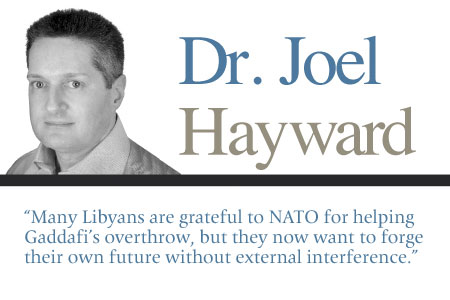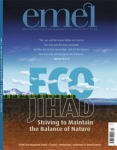
Leave Libya’s Future to the Libyans
Issue 85 October 2011
With the dramatic overthrow of another Middle East dictator, foreign nations should support, not intrude in Libyan affairs.
The wretched Gaddafi no longer holds power, and I am thrilled that the Libyan people now have the opportunity to decide what form their country should take. Yet I also feel worried that the National Transitional Council (NTC) will not be able, quickly or easily, to transform the ravaged country into a stable and functional political entity capable of satisfying the peoples’ needs.
Merely relocating from Benghazi to Tripoli won’t convince most Libyans that the NTC is a legitimate government which can or will organise some type of fair and transparent election in the near future. Its two key leaders, Mustafa Abdul Jalil and Mahmoud Jibril, are highly educated, competent and experienced. Yet their current “cabinet” is of inferior calibre and experience, and is not yet representative of Libya’s tribal and regional composition.
Still, if the NTC proves magnanimous in victory, manages to curtail retributive violence, stifles any insurgency, gets things working and provides a rough-and-ready form of security, most Libyans will be highly relieved and will probably support and empower it for the near future.
The NTC must immediately prevent an economic meltdown that would likely lead to a humanitarian catastrophe and societal collapse necessitating the type of “boots on the ground” intervention that Western forces have always promised not to undertake.
Keeping Libya viable will involve the unfreezing of more Libyan assets and the quickest possible restoration of Libya’s paralysed oil sector. Libya used to produce almost four per cent of the world’s oil and that commodity will remain the nation’s main source of revenue. Exporting oil will generate crucial income for whatever government emerges. At a local level, it will also combine with the payment of long-overdue government salaries to solve the six-month economic slump which has crippled local communities and caused tremendous hardship and public health problems.
It may take several months, but thankfully it will probably not take years, for the oil industry to regenerate. NATO deliberately never struck oilfields and refineries during its air campaign and both Libyan sides, well aware of the importance of those installations in their post-war future, did relatively little damage to them as they waged war.
Buoyed by the prospect of fairly easy restoration, many foreign nations are already talking about contributing to “reconstruction” and “nation-building”. They are apparently motivated not only by a humanitarian urge to see Libya’s suffering end quickly, but also by their desire for Libyan oil. Several European states gained substantial supplies of Libyan oil before the civil war commenced in February. For their own domestic reasons they want to see that oil flowing again soon.
It would be unfair to criticise any nation that genuinely wants to help Libya to get back on its feet. It would also be unreasonable to attribute ulterior motives to those nations with substantial trade deals with Libya who might want to safeguard their investments by assisting the reconstruction of the shattered country.
Yet Libya will probably be troubled by internal disputes for quite some time and it cannot afford to have those inadvertently exacerbated by outside actors. Foreign nations should therefore provide aid and similar support, but not rush prematurely.
They should certainly exercise caution before responding to any appeals for either military stabilisation operations or assistance with the creation and training of a new Libyan army. Libya will eventually need a reconstituted army, but it seems to me that Arab or Muslim military trainers from across the region would prove to be less visible and invasive to the Libyan people than Western military support personnel. Indeed, a situation involving Muslim security support and military training might be a highly positive way of rebuilding bonds of trust across North Africa and the Middle East.
Other nations should be mindful that, stepping into that situation either prematurely or substantially—even under the banners of assistance, reconstruction, stabilisation or military training—might leave them appearing highly
opportunistic to Libyans. Many are grateful to NATO for helping to facilitate Gaddafi’s overthrow, but they all now want to forge their own future without external interference. Foreign nations should be very careful not to let their motives be misconstrued. As we know from recent wars in other Muslim lands, there is significant potential for grievances to grow if any foreign presence seems to become excessive. The world community should remember the lessons of past mistakes. l
Dr Joel Hayward is Dean of the Royal Air Force College. These are his personal views only.
Bookmark this |
|
Add to DIGG |
|
Add to del.icio.us |
|
Stumble this |
|
Share on Facebook |
|
Share this |
|
Send to a Friend |
|
Link to this |
|
Printer Friendly |
|
Print in plain text |
|


Comments
0 Comments